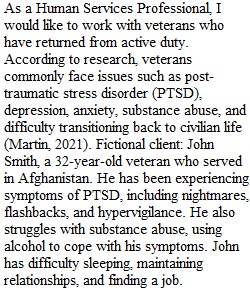


Q As a Human Services Professional, you will become familiar with the resources available within your agency/organization through on-the-job training and the experiences of working with a diverse clientele. Unfortunately, your agency/organization may not always have the necessary resources to fully serve the needs of your clients. In those circumstances, you will need to perform research to assist each client. When researching information and services related to a client's issue/problem, it is essential that you are able to differentiate between credible sources of information and those that are purely opinion-based. This skill is at the core of "information literacy." Information literacy involves the evaluation of resources and only utilizing sources that are valid and reliable. The use of valid and reliable sources means finding resources that are credible and factually-based (e.g., published peer-reviewed journals and websites of reputable businesses). Although resources such as blogs, Wikipedia, and posts on social media are generally not considered credible resources, they may provide basic insight which can help guide you to acceptable sources of information. Instructions: For this section of your course project, complete each of the following steps. In a 2-page Microsoft Word document, address the following. Step 1: Case Scenario Identify a target population you would like to work with as a Human Services Professional and research the stressors/issues commonly faced by individuals in that group. 1. Based on your research, invent a fictional client from that target population, give your fictional client a name, and write a brief scenario describing his/her case. 2. Implement a least one (1) credible resource and include one (1) intext citation. • Include any resources you used on the reference page. Step 2: Resources Investigate resources to help your fictional client with the problems described in the case scenario you created above. Consider local social service agencies, churches, support groups, national hotlines, and web-based services. 1. Identify at least two (2) local and two (2) national resources that you feel are credible and appropriate to help your fictional client resolve his/her stressor(s). For each of the 4 resources: • Provide a detailed description (e.g., name, location, and role of the service). • Explain your reasoning for selecting the resource. • Implement a least one (1) credible resource and include one (1) intext citation. • Include any resources you used on the reference page. General requirements: • Minimal to no spelling and grammar errors • Attempts APA intext citations • Provides references page in APA format Resources: • APA Guide 7th Edition • Writing Guide Note: Once you receive your graded submission, be sure to review the instructor's feedback and make appropriate edits in preparation for its re-submission as part of the final project, which is due at the end of Module 06. Submit your completed assignment to the drop box below. Please check the Course Calendar for specific due dates. Save your assignment as a Microsoft Word document. (Mac users, please remember to append the ".docx" extension to the filename.) The name of the file should be your first initial and last name, followed by an underscore and the name of the assignment, and an underscore and the date. An example is shown below: Jstudent_exampleproblem_101504
View Related Questions